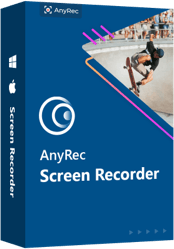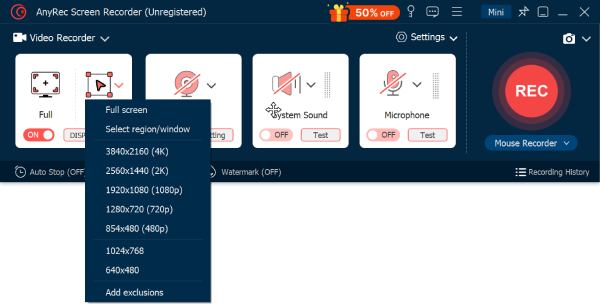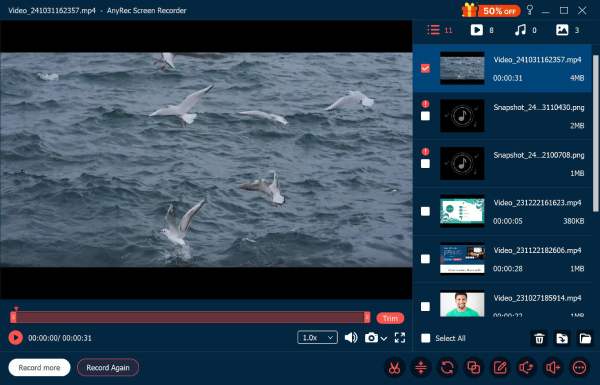Get 15+ Attention to Detail Interview Questions with Answers
Every hiring manager is frustrated about a new hire who, despite a great resume, consistently misses crucial details. Effectively assess this trait by asking attention to detail interview questions! For roles demanding accuracy and a commitment to quality, this article cuts through the guesswork, presenting more than 15 interview questions about detail-oriented traits and more. For this, you’ll be able to ask the right questions as the interviewer and provide precise answers as the candidate.
Guide List
15+ Interview Questions for Attention to Detail (with Example Answers) Red Flags to Watch for During Interviews What to Speak to Have Good Attention to Detail Record Candidates' Responses15+ Interview Questions for Attention to Detail (with Example Answers)
Attention to detail is a vital soft skill that affects quality and accuracy in every job. Whether you're proofreading a report, following a process, or analyzing data, catching small errors can make a huge difference to the outcome. The following attention to detail interview questions may help you get ready for your upcoming interview.
Behavioral Questions:
1. Describe a situation when you made a small mistake that led to consequences. How did you handle it?
"There was a time when I mistyped a product code, which resulted in an order delay. What I did was inform the team right away, correct the report, and follow up with the supplier to expedite delivery. Since then, I have used a checklist to check all codes before submitting".
2. Was there a time when your attention to detail saved a project from failure?
"Yes. While reviewing a proposal minutes before submission, I noticed that one data point was not updated, so I quickly searched for the latest figures, updated it, and saved the team from submitting inaccurate information".
3. Tell me about a time when you had to spot errors in someone else's work.
As for this interview question about attention to detail, you can answer: "I checked a teammate's presentation and noticed several incorrect data labels. I double-checked them using our CRM, corrected the errors and explained it to the team so we could prevent it from happening again in future reports".
4. Have you ever missed a detail that results in an issue? What did you learn from it?
"When I missed a minor date error that confused the client, I owned my mistake, corrected it and began applying a review process before sending out the final documents".
Situational Questions:
5. How would you ensure the accuracy of a spreadsheet with multiple data points?
"I would start by checking data sources with formulas to validate values. After completing it, I would ask a teammate for a quick review to notice anything I might have missed".
6. Imagine you have multiple tasks with the same deadlines. How do you avoid overlooking tiny but important details?
"I focus on tasks based on complexity and use time blocks to prioritize completely on one task. I also depend on task management tools to track progress". This answer to attention to detail interview question can be flexible according to your situation.
7. If a client thinks their data is correct but you have seen an error, how would you handle it?
"I would approach the client respectfully and guide them through what I’ve checked, using clear data to back it up. If they weren’t convinced, I would ask a teammate or manager to help resolve the issue".
8. How would you work on proofreading a 50-page document?
"I would break it into smaller sections first, then review afterwards. I would start with the grammar and spelling, then formatting and consistency". It’s a good answer to this pay attention to detail interview question.
Skill-assessment Questions
9. What tools should you use to stay detail-oriented at work?
"I use tools like Trello and Notion for task management, Grammarly for my writing, and Microsoft Excel for data validation".
10. Can you walk me through your quality control process?
"First, I review all requirements and define success criteria. Then, I build in checkpoints during the task, and for final review, I go over each step with a checklist to guarantee nothing has been skipped".
11. How do you let information be organized to ensure nothing is overlooked?
"I organize my tasks by category and due data with a color-coded system. I also keep digital notes searchable, and for much more complicated projects, I create dashboards that track milestones". There are also many different answers to this attentive to detail example.
12. When handling sensitive data, how do you make sure it’s stored accurately?
"I double-check all entries against original documents, utilize version control systems, and encrypt sensitive files. I'm also very careful about access permissions".
Soft Skill Insight Questions:
13. What’s your strategy when learning a complicated new process?
"I take notes as I learn, ask questions immediately, and create a straightforward guide for myself. Once I understand it, I will refine the process to make it more efficient".
14. How do you handle feedback about mistakes in your work?
"I see feedback as an opportunity to learn more. I listen openly and ask for improvements and how to adjust my approach".
15. Can you please explain how you balance speed with accuracy in your everyday tasks?
"I let myself work quickly during the first phase, but I created a schedule afterwards through review. By that, I won’t sacrifice quality over speed".
16. Tell me about when you had to explain a detailed process to your colleague.
"I helped a new teammate by breaking down the process into straightforward steps, creating a visual guide and walking them through each task".
Red Flags to Watch for During Interviews
Even when candidates seem so confident, certain cues can reveal concerns about how they work. Interviewers won't only spot strengths when asking attention to detail interview questions but can also identify potential red flags that could lead to issues. Here are some warning signs you should look out for as an employer:
- May Cut Corners Under Pressure. When asked how they handle tight deadlines, they might focus on speed over quality.
- Inconsistent Answers. If the candidate's answers are unclear or inconsistent with their resume, it may indicate a lack of self-awareness.
- Poor Listening Skills. Talking over the interviewer or giving an off-topic answer may indicate poor listening skills and a lack of attention to detail.
- Overconfidence Without Substance. While confidence is good, it may show a lack of humility when not backed up by solid experience.
- Negative Talk About Past Employers. Speaking poorly of former bosses or workplaces often reflects a negative attitude.
- Minimal Interest in the Company. If the candidate has not researched the position or company, it could suggest they are not fully invested in the job opportunity.
What to Speak to Have Good Attention to Detail
Simply saying "I'm detail-oriented" is not enough to answer one of those attention-to-detail interview questions; you must show it through language, examples, and mindset. Here’s what you should discuss to prove you have a strong attention to detail trait.
- 1. Describe the system you use to stay organized. You can discuss the tools, calendars, and processes you use to avoid overlooking small details.
- 2. Explain how you balance speed with accuracy. Employers value efficiency, so share how you manage time while maintaining accuracy.
- 3. Give examples of preventing mistakes. Share a time when you caught an error that others missed.
- 4. Show willingness to improve. Recognize when you have learned from not being able to spot an error and speak to how you handle feedback.
- 5. Mention how you support team accuracy. You can help others avoid mistakes and enhance the quality of a team.
Record Candidates' Responses
Whether interviewing candidates over a video or in person, it’s valuable to have a reliable way to record their responses to your interview questions about attention to detail. That is where AnyRec Screen Recorder shines. This friendly yet powerful tool captures interviews simply and professionally. It could be a webcam interview, audio-only, or a screen shared session, and AnyRec Screen Recorder still ensures you won't miss any single detail. You can record your screen with audio or webcam, whichever setup works best for your process, without affecting the quality.

Record full-screen, individual window, or custom area in excellent quality.
Adjust settings like resolution, format, frame rate, etc., to meet your standard.
Schedule recordings ahead of time, perfect for timed interviews.
Save in popular formats like MP4, AVI, MOV, and more for easy review.
Secure Download
Secure Download
Step 1. Open AnyRec Screen Recorder, then click "Video Recorder" from the main menu. Select "Full" or "Custom" to capture the interview area. You can head to "Settings" then "Output" to fine-tune your recording quality.

Step 2. Toggle on "Microphone" to record your voice, then switch on "System Sound" to record the other end. Balance both audio sources by adjusting the volumes.
Step 3. Once ready, click the "REC" button. You can use the annotation tools to make key responses or take a screenshot as needed.

Step 4. Wrap it up by clicking the "Stop" button. You will immediately see a preview of the recording, which you can watch and trim out long pauses. Once it gets cleaned up, click the "Save" button.

Further Reading
Conclusion
Using this guide's top 15 attention to detail interview questions, you can uncover how candidates think and work for accuracy. For the candidates, you can practice those questions and example answers to prepare for your upcoming interview. As an employer, it’s nice to capture conversations with clarity using AnyRec Screen Recorder to evaluate those responses. This program lets you record high-quality video and audio, add annotations, and save responses in formats you like. Make your interview process more professional by never missing a detail again with AnyRec Screen Recorder.
Secure Download
Secure Download
 A Guide to Reduce Background Noise While Recording [2025]
A Guide to Reduce Background Noise While Recording [2025]


